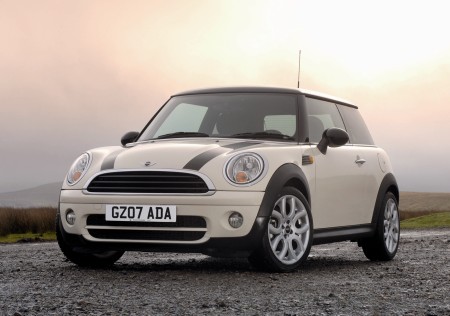
BMW-owned MINI recently commissioned YouGov PLC to conduct a survey on alternative fuels and technologies in Britain. It turns that few respondents were aware that some diesel-powered cars actually had lower CO2 emissions than the hybrids currently on the market. Of the cars included in the list (Honda Civic Hybrid, Toyota Prius, MINI Cooper D, Ford Focus 1.6 Duratorq TDCi and Citroen C4 1.6 HDi), most people thought the Civic Hybrid had the lowest emissions. In fact the MINI D was lowest at 104g/km equal to the Prius and ahead of the Civic's 109g/km.
The MINI D has a diesel engine combined with their regenerative braking system to charge the 12V battery and start/stop capability. The 60mpg (US) MINI provides a viable alternative to the hybrids with great real world fuel economy under both urban and highway driving conditions. If you live somewhere that doesn't have hefty tax brakes for hybrids it may also be a more affordable option. The BMW press release is after the jump.
[Source: BMW]
Research survey gives MINI the green light
09/03/2007
Confusion surrounding alternative fuels and related technologies is leading new car buyers to miss a trick. A recent YouGov Plc survey commissioned by MINI found that diesel-powered cars are thought to be way behind Hybrid models for cleanliness. Yet the 104g/km C02 emitted by the sporty MINI Cooper D is a figure that equals, and in many cases beats other cars using alternative technologies - including hybrids.
In a poll designed to gauge public understanding of CO2-related issues in the car purchase process, just three per cent of the 2,018-strong sample believed that a diesel-fuelled vehicle could be considered a low source of carbon emissions. Yet the new MINI Cooper D's 104 g/km is identical to the hybrid-powered Toyota Prius and lower than the 109 g/km achieved by the Honda Civic Hybrid.
Andy Hearn, General Manager for MINI UK, said: "Buyers looking for the most efficient cars could be missing out on the fun of driving a MINI. By developing sustainable diesel technology, MINI engineers have proved that you can have a low emissions car without compromising on driving characteristics and style."
A quarter of the survey's respondents believed the Honda Civic Hybrid was the lowest carbon-emitting vehicle from a list of five models.* Just two per cent plumped for the MINI Cooper D, perhaps misled by the sporty personality indicated by a Cooper badge. If only they knew.
Along with the rest of the MINI Hatch range, the MINI Cooper D now features a number of engineering enhancements.
Brake Energy Regeneration removes the need for a traditional alternator and reduces drag on the engine, thereby saving fuel. The Auto Start-Stop Function cuts out the engine when the car is brought to a halt and re-engages on depressing the clutch, again increasing fuel efficiency. Switch Point Display indicates to the driver the best gear for frugal driving. These technologies, as well as the Variable Turbine Geometry applied to the MINI Cooper D's turbocharger combine to make a torquey, yet economical and low-emitting sports hatch.
Well, those that know, know. The MINI Cooper D topped the poll for desirability, despite an apparent misunderstanding between car fuel sources and their relative carbon emissions.
So what else did MINI discover? The most important factor in buying a new car remains price. Fuel economy and style/design were placed second and third respectively. Great news for MINI. Taking into account MINI's low whole-life cost and its place at the top of the Lex Vehicle Leasing residual value chart, along with the Cooper D offering a combined fuel consumption of 72.4mpg and a unique design, the car again ticks every box.


Sign in to post
Please sign in to leave a comment.
Continue